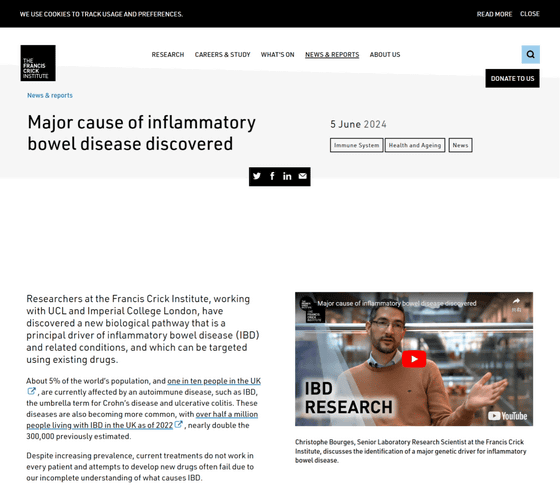Researchers discover the main cause of inflammatory bowel disease, which affects at least 7 million people worldwide

Inflammatory Bowel Disease (IBD), which includes the designated intractable diseases
A disease-associated desert gene directs macrophage inflammation through ETS2 | Nature
https://www.nature.com/articles/s41586-024-07501-1
Major cause of inflammatory bowel disease discovered | Crick
https://www.crick.ac.uk/news-and-reports/2024-06-05_major-cause-of-inflammatory-bowel-disease-discovered

Bowel disease breakthrough as researchers make 'holy grail' discovery | Digestive disorders | The Guardian
https://www.theguardian.com/society/article/2024/jun/05/bowel-disease-hope-researchers-find-biological-pathway
A research team from the Francis Crick Institute, University College London, and Imperial College London investigated non-coding DNA regions known as 'gene deserts' that have previously been linked to IBD and other autoimmune diseases and discovered the presence of 'enhancers.'
An 'enhancer' is like a 'volume dial' that can increase the amount of protein a gene makes. The enhancer discovered by the research group was only active in macrophages, which play a major role in inflammatory responses, and enhanced the function of a gene called 'ETS2.'
Using gene editing, the research group showed that ETS2 is essential for most inflammatory responses in macrophages, and surprisingly, increasing the amount of ETS2 in resting macrophages transformed them into inflammatory cells that closely resembled those in IBD patients.
Furthermore, the research group demonstrated that many genes previously believed to be associated with IBD are part of the ETS2 pathway, and that the ETS2 pathway is a major cause of IBD.
Major cause of inflammatory bowel disease discovered - YouTube
As there are no drugs that inhibit the function of ETS2, the research group searched for drugs that might indirectly suppress ETS2 activation and found that MEK inhibitors , which are already prescribed for other non-inflammatory diseases, would suppress the ETS2 inflammatory response.
When actually tested, it was found that the MEK inhibitor not only suppressed macrophages, but also the inflammatory response in intestinal samples from IBD patients.
Because MEK inhibitors have the risk of causing side effects in other organs, the research group is collaborating with the medical research organization LifeArc to explore ways to administer MEK inhibitors directly to macrophages.
Approximately 95% of IBD patients have one or two ETS2 enhancer variants. The research group believes that the reason why these variants remain so common is because ETS2 acted as a switch to protect against infection before the advent of antibiotics, and that these variants are particularly common in areas with high infection rates.
Related Posts:







